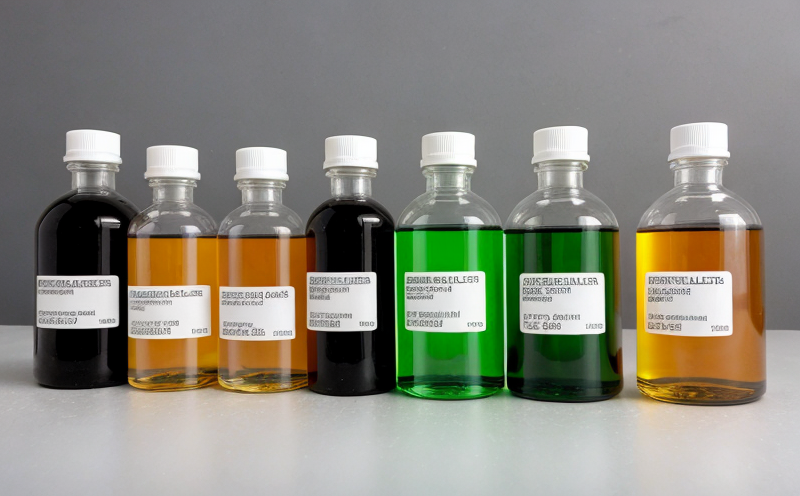Leachables Testing in Dialysis Device Systems
Dialysis devices are a critical component of end-stage renal disease (ESRD) treatment. Ensuring their safety and efficacy is paramount, especially given the direct contact with patients' blood and body fluids. Leachable substances from these systems can potentially pose significant risks to patient health if not properly characterized and controlled.
Leachables testing involves identifying and quantifying chemical compounds that migrate into the dialysis fluid from the device materials during operation. This process is essential for understanding the potential exposure of patients to harmful chemicals, ensuring compliance with regulatory standards, and maintaining product integrity.
The complexity of dialysis devices necessitates a thorough approach to leachables testing. These systems are composed of various materials such as plastics, metals, polymers, and coatings, each contributing unique chemical profiles under different operational conditions. Therefore, comprehensive extraction methods are required to simulate real-world scenarios accurately.
Common extraction solvents used in this process include water, ethanol, acetone, methanol, and phosphate-buffered saline (PBS). The choice of solvent depends on the material composition and expected leachable compounds. Once extracted, these substances undergo analysis using advanced analytical techniques such as high-performance liquid chromatography (HPLC), gas chromatography-mass spectrometry (GC-MS), and inductively coupled plasma mass spectrometry (ICP-MS).
The extraction process must be meticulously controlled to avoid contamination or loss of leachables. This includes maintaining precise temperature, pH levels, and time durations for each step. Additionally, the use of cleanroom environments and specialized laboratory equipment ensures accurate results.
Compliance with international standards is crucial in this field. The ISO 10993 series provides comprehensive guidance on biological evaluation of medical devices, including leachables testing. Specifically, ISO 10993-24:2017 offers detailed requirements for the identification and quantification of leachable substances from medical devices.
Given the critical nature of dialysis devices, regulatory bodies worldwide have stringent guidelines regarding leachables testing. Compliance with these standards not only ensures patient safety but also protects manufacturers against legal repercussions. For instance, in Europe, the European Union Medical Device Regulation (EU MDR) mandates rigorous compliance checks for all medical devices entering the market.
The significance of accurate and reliable leachables testing extends beyond regulatory compliance. It plays a vital role in product development by providing valuable insights into material interactions during device operation. This information can be leveraged to optimize design parameters, select safer materials, and enhance overall product performance.
Moreover, leachables testing supports clinical trial processes by ensuring that the devices used meet strict safety standards before being administered to patients in controlled environments. By identifying potential risks early in the development lifecycle, companies can mitigate costly recalls and improve patient outcomes.
Applied Standards
The application of international standards is fundamental in ensuring consistent and reliable leachables testing across different regions. Key standards include:
- ISO 10993-24:2017 - This standard provides guidelines for the identification and quantification of leachable substances from medical devices.
- ASTM E2386-18 - Offers a comprehensive approach to extractables and leachables studies in pharmaceutical products, which can be adapted for use with dialysis device systems.
These standards outline rigorous protocols for sample preparation, extraction methods, analytical techniques, and data interpretation. Compliance with these guidelines ensures that the testing process is standardized and reproducible, enhancing confidence in the results.
International Acceptance and Recognition
- Dialysis device manufacturers must adhere to global standards for leachables testing to gain acceptance in various markets. Regulatory bodies such as the U.S. Food and Drug Administration (FDA), European Medicines Agency (EMA), and Japan's Pharmaceuticals and Medical Devices Agency (PMDA) all recognize these international standards.
- Adherence to ISO 10993-24 ensures that dialysis devices meet stringent safety requirements, thereby facilitating smoother market entry in multiple jurisdictions.
- The FDA's Center for Devices and Radiological Health (CDRH) specifically emphasizes compliance with ISO standards as a key factor in approving new medical devices. This recognition enhances the credibility of manufacturers who follow these guidelines rigorously.
Competitive Advantage and Market Impact
Conducting thorough leachables testing offers significant competitive advantages in the highly regulated medical device industry. Compliance with international standards not only ensures regulatory approval but also builds trust among healthcare providers and patients. This can lead to increased market share and stronger brand loyalty.
Maintaining a robust quality management system that includes comprehensive leachables testing demonstrates a commitment to patient safety and product excellence. Such practices are increasingly valued by stakeholders, including insurance companies and healthcare organizations, who prioritize the use of safe and effective medical devices.
In addition, early identification and mitigation of potential risks through rigorous leachables testing can prevent costly errors during clinical trials or post-market surveillance. This proactive approach enhances product reliability and reduces the likelihood of recalls, which are detrimental to both reputation and revenue.





